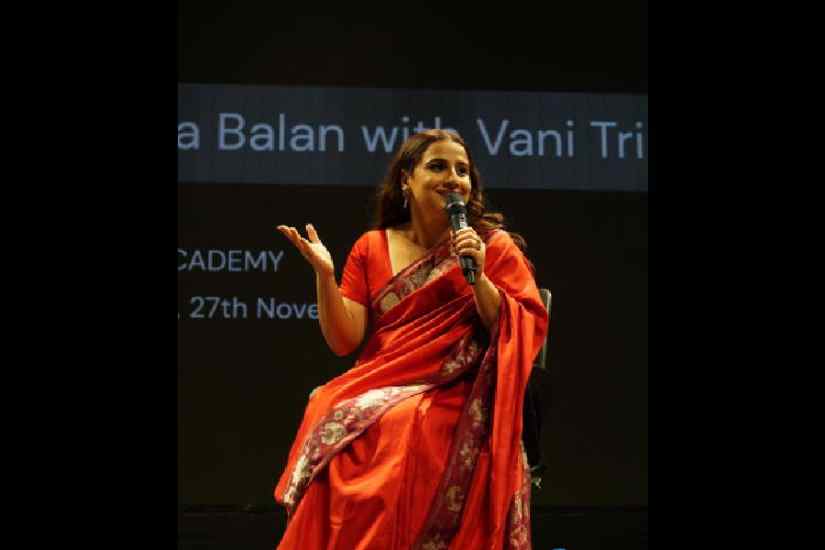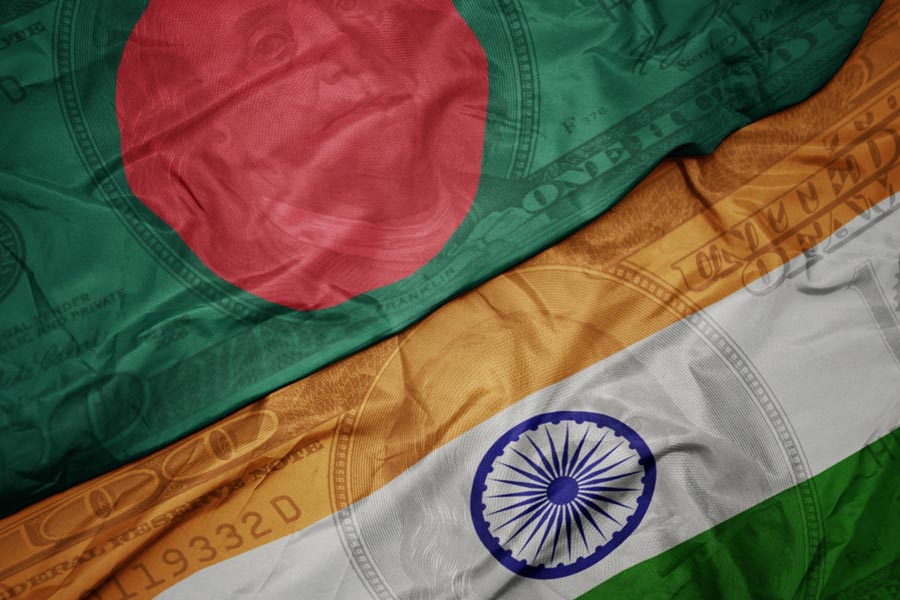Vidya Balan was a special guest at the recently concluded International Film Festival of India (IFFI) held in Goa. The actor, who has shattered many a stereotype through her unconventional roles, spoke at a session titled ‘Women and the Glass Ceiling’, moderated by Vani Tripathi Tikoo. Excerpts.
Vani Tripathi Tikoo: Vidya, you are one of the few women actors we have who has consistently broken the glass ceiling. Globally, when I talk about women in cinema, I always start with you. You did The Dirty Picture and broke the patriarchy which existed in many narratives.
Vidya Balan: The biggest credit for this must go to Ekta Kapoor. It is the business of cinema and every buck matters. People are very conservative when it comes to investing money in a film, which is why, historically, since we have had hero-led films, it’s easier to invest your faith and, therefore, your money in them. But Ekta had the guts and the gumption to say: ‘This (The Dirty Picture) is a story I want to tell.’ I think I was at the right place at the right time.
I was doing certain kinds of films but it was not like some burning desire that I wanted to prove to the world that even women can lead films. But I always thought that it would be so much fun if I could be the ‘hero’ of a film. And I think the universe listened and things started falling in place. While I am credited for being the face of this change and I am very grateful for it, I believe that it is the work of everyone before me... every female actor, even those who did the so-called inconsequential roles, has brought us to this place. It’s their frustration, it’s their answers and their desire for more, all of which have propelled us further to reach a stage where we are now telling women’s stories.
Also, the world around us has changed and women are now taking centre stage in their lives. Therefore, we are okay to see a reflection of that on screen. We are not being defined by our relationships with the men in our lives anymore. We are our own people and that’s what we are seeing in cinema. That’s why we are willing to go and buy a ticket and watch those films on screen.
Vani: You are being simplistic about it. You played Silk Smitha, a scorned woman who was constantly judged for who she was. We really need to know more about that journey.
Vidya: I was very excited at the prospect of getting to play Silk. But the first time Milan Luthria (director) came to me, I couldn’t believe that someone would actually offer me this role. But there was this burning desire to do things that people couldn’t imagine I could do... but I knew I could.
I said ‘yes’ instinctively. It was only later when it started making news that there were some people who told me: ‘Are you sure? It may actually ruin your career.’ They told me that I had always been Miss Goody Two Shoes. And I said: ‘Miss Goody Two Shoes ka kya matlab hain? I have hardly done five-six films. It’s not like I have had 30 years in films and then I am going to try something different. This is why I’m an actor.’
I just enjoyed the process of breaking the shackles, of getting out of my comfort zone. It required a lot of work. It didn’t happen as easily as I thought. But when it happened, it was so liberating and very rewarding.
The kind of acceptance that I felt towards my body after that... it was a film that changed my life. Playing this character made me realise that we are no one to judge another... to each his own. Before The Dirty Picture, even I have looked at women who dressed a certain way in a certain light. But this film helped me evolve. It opened my eyes to the fact that this is just the superficial, the exterior. One, the body is not the person, and secondly, what anyone does with their body is their choice. As a woman, your body is constantly changing. And that helped me realise that whatever it is, it is my body. It’s keeping me alive. And it’s beautiful, and I began to celebrate my body.
Vani: You are known to do very, very crazy things. In Paa, you played mother to Amitabh Bachchan!
Vidya: When Balki (director) came to me, I was like: ‘What sort of a story is this?!’ I didn’t believe it. But later when I re-read the script, I was completely blown. There was this hunger in me that I just wanted to do this role. But I will admit that there was some trepidation. People tell you that you shouldn’t be playing a mother, even to little kids in films, because then you will be playing mother for the rest of your life. And blah, blah, blah.
And in Paa, I was going to be playing mother to a 67-year-old actor, and that too, Amitabh Bachchan! But I was like: ‘What am I acting for if I don’t take up these roles? I want to be living different women’s lives through the characters I play. And this is giving me such a great opportunity.’ I knew that Balki would tell the story really well. And he did so.
But before that, I had the feeling — and with no disrespect — that I hope I don’t become the next Nirupa Roy! People do scare you. But the process was so magical. It made me realise what I am here to do. Lots of people ask me: ‘Don’t you want to write? Don’t you want to direct?’ I say: ‘No, I want to be in front of the camera. I love it.’ The camera is my deepest love.
To go on redefining things which are so structurally defined is your prowess. You changed so many things with Kahani which was a bomb of a film....
Vidya: Even today, so many people tell me that Kahani is one of their favourite films. And it feels so good. They narrate instances from the movie. I think it was just Sujoy’s (Ghosh, director) brilliance. He observes little things, it’s almost scary. Like if a car passes by, and he’s talking to you, he will know the number of the car. I would constantly tell him that I wanted to see this brilliance in a script.
And then he brought Kahani to me, which even when it was a one line sounded unbelievably good. Kahani is very special because I got to be part of the writing process. I didn’t contribute in any way. But every scene that he wrote, he would bring to me and say: ‘Listen, respond to this.’ So I felt a part of the process. It was one of the best collaborative experiences in my career.
Vani: You kept playing sleuths and cops, which are seen as very male-centric in the centrepiece of cinema in our country. That itself is the biggest crack in that glass ceiling. One of the things that I mostly see in you is that you are not scared of being un-beautiful on screen....
Vidya: I believe that beauty is as beauty does. So if it serves the purpose of bringing alive a character, I will try and transform myself with all the tools I have... make-up, hair, costume, mannerisms, voice. I am not a trained actor, so it’s always a lot of work. I get bored as a person very easily. So to constantly keep myself engaged, I have to do new things. Which is why I think I won’t be able to do theatre. That’s because you have to look for the truth day after day in the same material. I am constantly looking for new stories, for characters that don’t seem familiar. Or sometimes they seem familiar but I haven’t quite explored that aspect.











